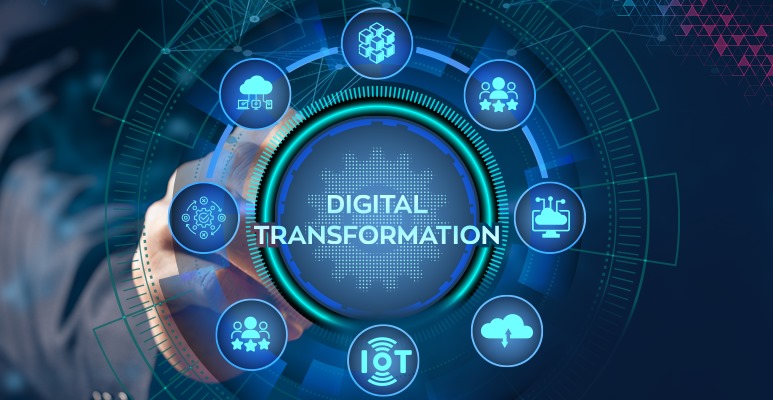Understanding Digital Transformation: An Overview:
Digital transformation stands as the metamorphosis that modernizes organizational strategies, technology integrations, and cultural shifts to enhance business models through innovative digital solutions. In essence, it’s the engine fueling the evolution and adaptation of businesses in an increasingly digitized world.
Why Does Digital Transformation Matter?
This section will delve into the importance of digital transformation in the modern landscape, focusing on aspects like staying competitive, meeting evolving customer expectations, improving operational efficiency, and driving innovation.
The Driving Forces Behind Digital Transformation
Digital Transformation, the catalyst for modern business evolution, is powered by several driving forces that reshape industries and redefine success.
- Data Upscaling: In the era of digital transformation, data amplification is the key, where information is not only larger and faster but encompasses various dimensions, driving insights and decision-making.
AI for All: Artificial Intelligence (AI) is democratizing, making its adoption widespread across industries, providing accessibility and paving the way for innovative solutions and enhanced processes.
Competitive Evolution: Digital transformation is no longer a choice but a necessity for businesses, a survival imperative in the rapidly evolving and competitive landscape.
Agile Dynamics: The demand for flexibility in processes and strategies is crucial, necessitating agile dynamics to swiftly adapt to changing market conditions and consumer demands.
Automation Surge: Remote collaboration experiences a significant impact through automation, streamlining and enhancing operational processes, contributing to a paradigm shift in how teams work together.
Key Digital Transformation Trends to watch in 2023:
- Customer-Centric Experience: Businesses recognize the paramount importance of providing personalized experiences to customers. Through leveraging data analytics and customer insights, companies tailor products and services, creating unique and memorable interactions. This approach isn't just about satisfying customers but building loyal relationships, as 86% of buyers are willing to pay more for a better customer experience.
Cloud Shift and Multi-Cloud Plans: The migration towards multi-cloud environments becomes a prevailing trend. This shift enables companies to diversify their cloud providers, offering a more flexible, scalable, and resilient digital infrastructure. With over 75% of organizations embracing a multi-cloud approach, this strategy ensures operational continuity, improved resource utilization, and risk reduction by distributing workloads across platforms.
AI & ML in the Mainstream: Artificial Intelligence and Machine Learning are no longer futuristic concepts but are deeply embedded in everyday business operations. Their integration allows for data-driven decision-making, automation of processes, and increased innovation. With over 70% of businesses integrating AI solutions, the trend not only enhances productivity but also shapes new product and service offerings.
IoT Innovations: The proliferation of IoT devices continues to transform business practices. With an estimated 30 billion connected devices in use, companies harness the power of real-time data insights for process automation, operational efficiencies, predictive maintenance, and the development of innovative revenue streams.
Edge Tech: Edge computing emerges as a game-changer, with more than 60% of data processing shifting to the edge. This trend significantly reduces latency, facilitating real-time data processing and analysis. By bringing computation closer to data sources, edge technology enables faster responses and enhances the efficiency of real-time applications.
Automated Solutions: As automation handles an increasing proportion of routine tasks (expected to reach 85% by 2023), businesses focus on optimizing operational processes, reducing errors, and enhancing productivity. Automation isn't merely about cutting costs but about streamlining workflows, improving accuracy, and enabling employees to focus on more value-added tasks.
Blockchain: Business's Future: Blockchain technology becomes integral to business strategies, transforming the way transactions are conducted. With an expected 50% adoption rate in 2023, blockchain offers increased security, transparency, and trust across various industry sectors. It's poised to revolutionize financial transactions, supply chain management, and secure data sharing practices.
The Future of Digital Transformation
The future of digital transformation, set to hit $1.2 trillion by 2025, emphasizes AI, IoT, and edge computing, driving innovation. Customer-centric strategies lead to 86% of buyers willing to pay more for better experiences. Multi-cloud adoption, with over 75% of businesses embracing it by 2023, ensures flexibility and resilience. Automation, reaching 85% of routine tasks by 2023, streamlines operations for enhanced productivity.

